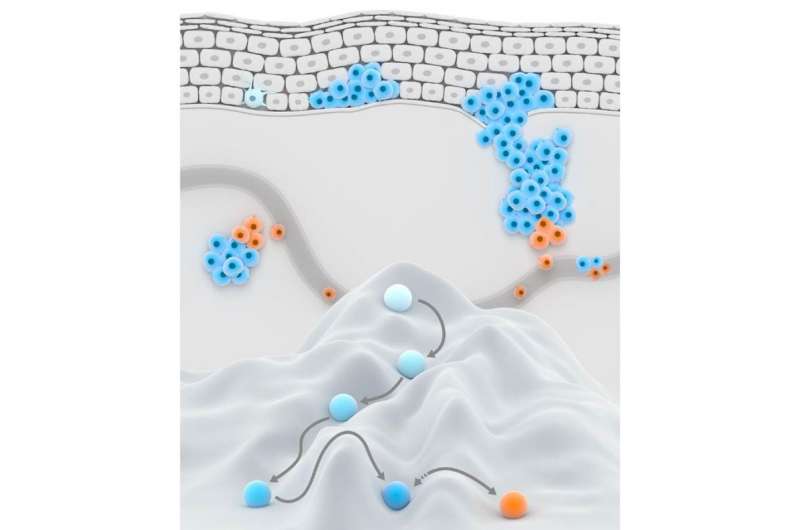Epigenomic changes play an important role during the progression of melanoma

KU Leuven researchers have zeroed in on what makes cancer cells in melanoma so aggressive. They also succeeded in taming the effect in cell cultures. Melanoma, a type of skin cancer, is notoriously quick to metastasize and responds poorly to existing cancer treatments. In their study, published in Nature Communications, the researchers report a significant step forward in the characterization and potential treatment of melanoma.
Human DNA contains genetic information that makes our cells functional entities within a larger whole. The stream of information from DNA to function happens in the form of proteins that anchor themselves to various locations in the DNA and transcribe genetic information into functional cell parts. This process is strictly regulated and is thus very sensitive to change by external factors.
Such changes, called gene-regulatory or epigenomic changes, can alter the regular stream of information between the DNA and the cell without actually altering the DNA itself.
In their study, Professor Stein Aerts (KU Leuven) and Professor Chris Marine (VIB/KU Leuven) were able to confirm that epigenomic changes play an important role in the development and progression of melanoma.
Previous research has shown that melanomas are made up of various types of cells. Each subpopulation of cells in the tumour has different characteristics. What makes melanoma so aggressive, say the researchers, is the existence of a subpopulation that causes progression and metastasis of the cancer. These cells also increase the resistance of the tumour to current cancer drugs.
The researchers found that these subpopulations do not arise from mutations or errors in the DNA itself but are the result of changes in the stream of information from the DNA to the cell. In a first phase of cancer, specific proteins bind themselves to specific locations in the DNA, which allow the tumour to grow. In a second, more aggressive phase, other proteins are activated that bind to other DNA sites, which allow the cancer cells to invade and spread to other tissues in the body.
Professor Aerts and his team succeeded in mapping the epigenomic landscape in both phases of melanoma progression. They identified the proteins and the thousands of regions on the DNA to which the proteins bound themselves. Furthermore, when the researchers knocked out these proteins, the melanoma became much less aggressive and more receptive to existing cancer drugs.
This is the first complete epigenomic profile of melanoma and the first study to map the regulatory landscape of the different melanoma cell states.
The results contribute to a more complete picture of cancer cells during melanoma progression and constitute an important step forward in the search for more targeted, more effective therapies for this aggressive type of cancer.
More information: The paper "Decoding the regulatory landscape of melanoma reveals TEADS as regulators of the invasive cell state" by Annelien Verfaillie, Hana Imrichova, Zeynep Kalender Atak, Michael Dewaele, Florian Rambow, Gert Hulselmans, Valerie Christiaens, Dmitry Svetlichnyy, Flavie Luciani, Laura Van den Mooter, Sofie Claerhout, Mark Fiers, Fabrice Journe, Ghanem-Elias Ghanem, Carl Herrmann, Georg Halder, Jean-Christophe Marine, and Stein Aerts was published online in the journal Nature Communications on 9 April 2015. DOI: 10.1038/ncomms7683
















